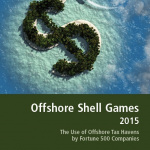Offshore Shell Games 2015
The Use of Offshore Tax Havens by Fortune 500 Companies
U.S.-based multinational corporations are allowed to play by a different set of rules than small and domestic businesses or individuals when it comes to the tax code. Rather than paying their fair share, many multinational corporations use accounting tricks to pretend for tax purposes that a substantial portion of their profits are generated in offshore tax havens, countries with minimal or no taxes where a company’s presence may be as little as a mailbox. Multinational corporations’ use of tax havens allows them to avoid an estimated $90 billion in federal income taxes each year.
Downloads
Illinois PIRG Education Fund

U.S.-based multinational corporations are allowed to play by a different set of rules than small and domestic businesses or individuals when it comes to the tax code. Rather than paying their fair share, many multinational
corporations use accounting tricks to pretend for tax purposes that a substantial portion of their profits are generated in offshore tax havens, countries with minimal or no taxes where a company’s presence may be as little as a mailbox. Multinational corporations’ use of tax havens allows them to avoid an estimated $90 billion in federal income taxes each year.
Congress, by failing to take action to end to this tax avoidance, forces ordinary Americans to make up the difference. Every dollar in taxes that corporations avoid by using tax havens must be balanced by higher taxes on individuals, cuts to public investments and public services, or increased federal debt.
This study examines the use of tax havens by Fortune 500 companies in 2014. It reveals that tax haven use is ubiquitous among America’s largest companies and that a narrow set of companies benefits disproportionately.